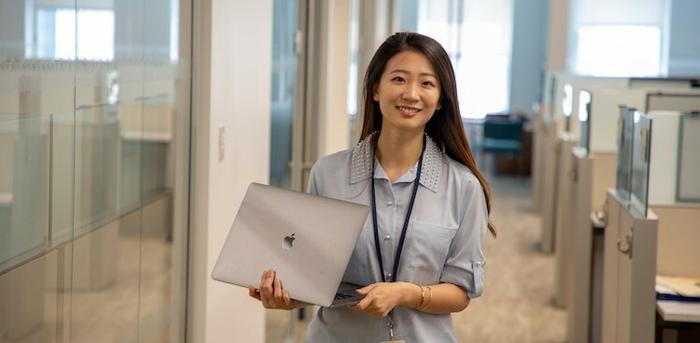
This is the third in a series of interviews with women who work in tech at Prudential: what they do, how they got there, and their words of wisdom for anyone interested in pursuing a career in technology.
Amy Liaw, a data scientist at Prudential, knows how important community and connection are to women technologists. After all, she got her job after meeting a Prudential representative at Grace Hopper Celebration, the world’s biggest tech conference for women.
So she makes sure to pay it forward as a volunteer mentor for Prudential’s annual partnership with Girls Who Code Summer Immersion Program. Designed to teach rising 10th- and 11th-grade girls the fundamentals of computer science, the program is part of Girls Who Code’s mission to close the gender gap in technology.
“Sharing my experiences has been very exciting and rewarding,” Liaw says. “I want to continue to encourage girls to not be afraid of working in tech and to have the determination to do something you know you can and that you like.” Here, she explains why this program is so meaningful—for her as well as for the students who participate.
How does Prudential’s partnership with Girls Who Code work?
Roughly 20 girls from local high schools come to Prudential’s Newark offices every day for seven weeks. They learn to use the Python programming language to break down computational problems into steps; they analyze data and draw conclusions based on analysis; and they build websites using HTML/CSS and JavaScript as their final project. By the end of the program, the website they’ve developed has everything from video to animation pop-ups and the functionality to link to social media. To put a functional website together using all they learned in such a short time makes the girls feel very proud!
You have a bachelor’s of science in finance and information management and technology as well as a master’s in data science. Did you talk to the girls about what college path they should pursue?
I shared my experience about choosing my college major. I told them to take a variety of classes, to see which field they’re good at and feel excited about, and about the importance of internships during college, so they can get a sense of which career path suits them. I encouraged them to be brave and accept challenges, because you never know where they might lead. It’s rewarding to share experiences and help them figure out what an obstacle might be in their path—like finding the right college, or tuition and getting scholarships.
Besides the nitty-gritty of learning programming, how else does the program help teenage girls?
For many the experience backs up their objectives for what they want in a profession. The girls are really ambitious and motivated. Some of them have clear objectives. They know which college they’re planning to go to and which major they’re going to pursue. Girls Who Code gives them a broad idea of what coding and programming is and whether they like it, or they discover perhaps that they don’t like it, which is also valuable.
What kinds of things might they learn specifically at Prudential?
One of the groups did a final project on elderly services, researching what the elderly would need, like doctor appointments and other services. That’s an example of learning domain knowledge, which helped them develop their final coding project.
With Girls Who Code, you act as a mentor—but do you have a mentor of your own?
Yes! At Prudential we have a mentorship program where every new hire is assigned a mentor to help onboard you to the organization. You can talk through anything with your mentor that you might not feel comfortable discussing among your teammates, like career-path issues.
I’m lucky to have a great mentor who provided me with a lot of resources, and I follow that same example with the girls. I provide resources like study-abroad opportunities, scholarships, or self-learning tutorials on coding that you can access online for free. I listen to what they’re doing in school, and hear fun stories from home with their families, and I’ve learned about new websites from them, too! It’s a really great opportunity for girls to get exposure to technology and be able to decide whether they’ll pursue it in college as a major.